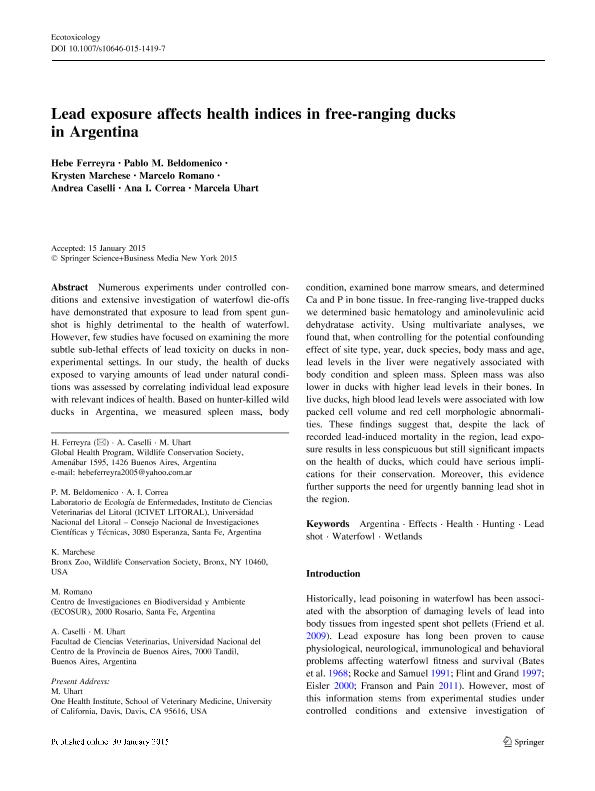Mostrar el registro sencillo del ítem
dc.contributor.author
Ferreyra, Hebe
dc.contributor.author
Beldomenico, Pablo Martín

dc.contributor.author
Marchese, Krysten
dc.contributor.author
Romano, Marcelo
dc.contributor.author
Caselli, Andrea
dc.contributor.author
Correa, Ana Ines

dc.contributor.author
Uhart, Marcela Maria

dc.date.available
2017-07-12T21:03:04Z
dc.date.issued
2015-05
dc.identifier.citation
Ferreyra, Hebe; Beldomenico, Pablo Martín; Marchese, Krysten; Romano, Marcelo; Caselli, Andrea; et al.; Lead exposure affects health indices in free-ranging ducks in Argentina; Springer; Ecotoxicology; 24; 4; 5-2015; 735-745
dc.identifier.issn
0963-9292
dc.identifier.uri
http://hdl.handle.net/11336/20292
dc.description.abstract
Numerous experiments under controlled conditions and extensive investigation of waterfowl die-offs have demonstrated that exposure to lead from spent gunshot is highly detrimental to the health of waterfowl. However, few studies have focused on examining the more subtle sub-lethal effects of lead toxicity on ducks in non-experimental settings. In our study, the health of ducks exposed to varying amounts of lead under natural conditions was assessed by correlating individual lead exposure with relevant indices of health. Based on hunter-killed wild ducks in Argentina, we measured spleen mass, body condition, examined bone marrow smears, and determined Ca and P in bone tissue. In free-ranging live-trapped ducks we determined basic hematology and aminolevulinic acid dehydratase activity. Using multivariate analyses, we found that, when controlling for the potential confounding effect of site type, year, duck species, body mass and age, lead levels in the liver were negatively associated with body condition and spleen mass. Spleen mass was also lower in ducks with higher lead levels in their bones. In live ducks, high blood lead levels were associated with low packed cell volume and red cell morphologic abnormalities. These findings suggest that, despite the lack of recorded lead-induced mortality in the region, lead exposure results in less conspicuous but still significant impacts on the health of ducks, which could have serious implications for their conservation. Moreover, this evidence further supports the need for urgently banning lead shot in the region.
dc.format
application/pdf
dc.language.iso
eng
dc.publisher
Springer

dc.rights
info:eu-repo/semantics/openAccess
dc.rights.uri
https://creativecommons.org/licenses/by-nc-sa/2.5/ar/
dc.subject
Argentina
dc.subject
Effects
dc.subject
Health
dc.subject
Hunting
dc.subject
Lead Shot
dc.subject
Waterfowl
dc.subject
Wetlands
dc.subject.classification
Otras Ciencias Veterinarias

dc.subject.classification
Ciencias Veterinarias

dc.subject.classification
CIENCIAS AGRÍCOLAS

dc.title
Lead exposure affects health indices in free-ranging ducks in Argentina
dc.type
info:eu-repo/semantics/article
dc.type
info:ar-repo/semantics/artículo
dc.type
info:eu-repo/semantics/publishedVersion
dc.date.updated
2017-07-07T20:07:25Z
dc.journal.volume
24
dc.journal.number
4
dc.journal.pagination
735-745
dc.journal.pais
Alemania

dc.journal.ciudad
Berlin
dc.description.fil
Fil: Ferreyra, Hebe. Wildlife Conservation Society; Estados Unidos
dc.description.fil
Fil: Beldomenico, Pablo Martín. Consejo Nacional de Investigaciones Científicas y Técnicas. Centro Científico Tecnológico Conicet - Santa Fe. Instituto de Ciencias Veterinarias del Litoral. Universidad Nacional del Litoral. Facultad de Cs.veterinarias. Instituto de Ciencias Veterinarias del Litoral; Argentina
dc.description.fil
Fil: Marchese, Krysten. Wildlife Conservation Society; Estados Unidos
dc.description.fil
Fil: Romano, Marcelo. Centro de Investigaciones en Biodiversidad y Ambiente(ECOSUR); Argentina
dc.description.fil
Fil: Caselli, Andrea. Wildlife Conservation Society; Estados Unidos. Universidad Nacional del Centro de la Provincia de Buenos Aires. Facultad de Ciencias Veterinarias; Argentina
dc.description.fil
Fil: Correa, Ana Ines. Consejo Nacional de Investigaciones Científicas y Técnicas. Centro Científico Tecnológico Conicet - Santa Fe. Instituto de Ciencias Veterinarias del Litoral. Universidad Nacional del Litoral. Facultad de Cs.veterinarias. Instituto de Ciencias Veterinarias del Litoral; Argentina
dc.description.fil
Fil: Uhart, Marcela Maria. Wildlife Conservation Society; Estados Unidos. University of California; Estados Unidos. Universidad Nacional del Centro de la Provincia de Buenos Aires. Facultad de Ciencias Veterinarias; Argentina
dc.journal.title
Ecotoxicology

dc.relation.alternativeid
info:eu-repo/semantics/altIdentifier/doi/http://dx.doi.org/10.1007/s10646-015-1419-7
dc.relation.alternativeid
info:eu-repo/semantics/altIdentifier/url/https://link.springer.com/article/10.1007/s10646-015-1419-7
Archivos asociados
